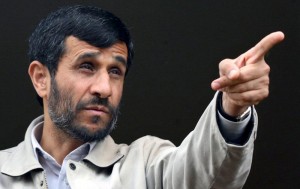
My initial reaction, on reading the full text of Mir Hossein Mousavi's Saturday interview on the immediate past and immediate future of the Green Movement, was feeling let down. Mousavi had offered a lengthy dissection of the regime's "success" on 22 Bahman (11 February), mobilising the rally in Azadi Square and blocking any mass Green display. He had stated his determination, shared by others, to "express our emotions, aspirations, and concern as a nation".
Mousavi had declared, "The Green Movement has stood firm in its civil demands. The more people’s awareness of their rights increases, the bigger will be the force behind those demands."
Yes, I thought, but what would those demands be beyond the general assertion of freedom, justice, and rights? What endpoint for this people's force? In the end, was Mousavi's "Being green is a matter of behavior and morals" an evasion rather than a confrontation of the next phase of the post-election crisis?
Others shared this perception. Borzou Daragahi, one of the sharpest observers of the Iran situation, wrote over the weekend that not only Mousavi but Karroubi
offered no measures for the way forward. Daragahi
repeated this when he put forth Mohammad Khatami's Monday statement, "We should not retreat from our demands." Mahmood Delkhasteh
writes in The Huffington Post of the "schizophrenic Green Movement".
But as Sunday gave way to Monday and then Tuesday, I looked back over the Mousavi statement and the Khatami declaration and, before them, Mehdi Karroubi's interviews with his website and with an Italian newspapers. I read them as I watched the regime scramble, perhaps coherently, perhaps not, between prisoner releases, suspension of newspapers, and propaganda.
And I realised I was very wrong.
My mistake, which I think is common, was to think in terms of a "grand strategy". Mousavi would lay out the Green Path not just as one of hope but as a well-marked political landscape on the future of the Supreme Leader, the institutions in the Islamic Republic, and indeed the Republic itself. He would offer a new set of tactics to replace the attempts at mobilisation on national holidays --- the opposition would not hijack the regime's occasions but come up with those which were solely Green. Mousavi's would liberate the detainees, free the press, silence the purveyors of untruths, remove Ahmadinejad and his cronies, and show Khameini that he was not above the Iranian system but one part of it.
My mistake was to forget that sometimes the way forward is just to ensure someone sees you are still standing.
On 1 January, Mousavi had put out a 5-point programme which is as close as he has come to a "grand strategy": Government accountability, free press, freed political prisoners, free assembly, new election laws. If the Government could not deliver this, it would be replaced. If the Supreme Leader could not assure this, his position would be questioned.
But conditions change, events intervene. 22 Bahman was a major disappointment for those in the opposition who thought it would mark the end --- maybe not on that day but soon, very soon --- of the regime. The Green movement had been present on that day but, with the confusion in tactics and facing the massed forces of the State, it had not been seen.
So Mousavi, while he referred to his 1 January in his interview, had more immediate tasks. He first took apart the idea of a "natural", overwhelming support for the regime, represented by the 22 Bahman turnout: these were "engineered rallies".
Where on the day, beyond Tehran, was the supposed effusive endorsement of the Government? Where, in the following three weeks, has that support been? Where, once the mobilisation for a few hours is over, is the "63%" that supposedly re-elected President Ahmadinejad last June?
Mousavi's harder job, however, was to assess his own camp, to find the rays of light amidst the "difficult conditions" and "damage" inflicted by the regime through detentions, violence, suppression, and abuse of laws? Re-presenting the tablets of his five points on 1 January would only bring the response: yes, and how exactly is this to occur?
So Mousavi's effort was not to elucidate the "civil demands", not at this moment, but to give the assurance that the the demands would continue to be made. Shut down the Green Movement's newspapers and journals, and we will work through social media. Berate us with propaganda, but we will persist in our "spread of awareness". Threaten us, jail us, bribe us with release for our silence, but we will not disappear.
And that is not just Mousavi's statement. It was Karroubi's last week, and Khatami's yesterday. Away from the headlines offered by those men, it is the message every hour of every day from those who continue to get word out that matters are not settled inside Iran.
So Mousavi and Karroubi made specific if not-so-limited demands to represent that persistence. You have crushed us? Then give us our freedom of assembly, since we are not that many. You have defeated us? Then give us a referendum on your supposedly respected institutions, let's say, the Guardian Council.
In his interview, Mousavi placed the key sentence, "If this crisis is not resolved, the legitimacy of the ruling establishment will plummet even faster."
At some point, having assured its survival, the opposition will need to make its resolutions over a strategy that goes beyond "We are still standing." But the lack of resolution at this moment and for the foreseeable future, is not "victory" for the regime. To the contrary, it is testimony that legitimacy has not been secured.
Just because the end of the path is not seen, does not mean that it has been obliterated....
 Monday, March 22, 2010 at 4:55
Monday, March 22, 2010 at 4:55  A reliable EA source passes on these insights from a well-placed contact:
A reliable EA source passes on these insights from a well-placed contact:




